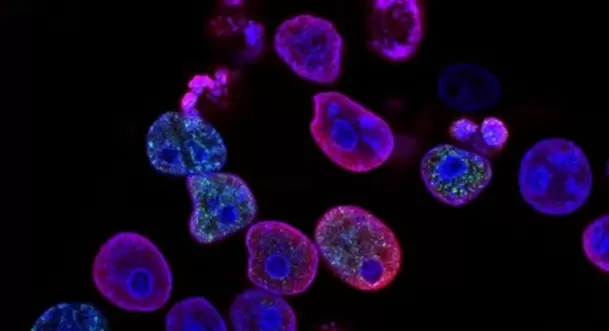US scientists start trial on vax for preventing pancreatic cancer
Washington
23-May-2022

Photo: IANS
In a breakthrough, US scientists have started a trial on a vaccine that will protect people from developing pancreatic cancer.
According to experts, more than 90 per cent of pancreatic cancer cases develop after the organ's cells develop a mutation to a particular gene called KRAS. The mutation makes cells divide uncontrollably, which eventually means cancer.
While some people are more prone to developing the KRAS fault than others, scientists speculate that pancreatic cancer can be prevented by eliminating the cells containing the errant gene.
And the novel vaccine does exactly the same.
It is able to equip the human body with the tools that can find rogue cells, which can in the long run become cancerous. This enables the immune system to launch preemptive 'search and destroy' missions that will continually nip the problem in the bud, the report said.
Survival rates for pancreatic cancer have been stubbornly low with three-quarters of patients dying within a year of diagnosis.
Watch This TWL Video
Thus, "the best way of treating this disease is catching it early because it's so challenging. As the cancer develops, it becomes harder to treat. And it's very good at hiding from our immune system", oncologist Dr Neeha Zaidi, who is leading the trial, was quoted as saying.
Zaidi noted that people aren't born with the KRAS mutation, it takes at least a decade from the first mutation occurring, to the development of pancreatic cancer.
The vaccine prompts the immune system to recognise cells containing the mutated KRAS gene through tiny protein 'flags' on the surface, the report said.
Besides exploring the safety profile of the vaccine, the trial will also gauge the 'immune response' it triggers. In particular, the team will look for aT-cells' specifically capable of recognising KRAS-infected cells, the report said.
Meanwhile, Zaidi noted that it can take upto a decade to get hard evidence that the vaccine prevented pancreatic cancer. "This is the first step to a very large goal," she stressed. - IANS
More Headlines
India Achieves 7.93% Drop in GHG Emissions in 2020, Demonstrates Climate Leadership
Anand Mahindra on Work-Life Debate: Focus on Quality, Not Quantity, for ‘Viksit Bharat’
TN Police Launches Campaign Against Caste Discrimination In Schools, Colleges
India’s 1st Robotic System Performs Telesurgeries Over A Distance Of 286 Km
PM Narendra Modi Makes Podcast Debut with Nikhil Kamath on 'People By WTF'
India Achieves 7.93% Drop in GHG Emissions in 2020, Demonstrates Climate Leadership
Anand Mahindra on Work-Life Debate: Focus on Quality, Not Quantity, for ‘Viksit Bharat’
TN Police Launches Campaign Against Caste Discrimination In Schools, Colleges
India’s 1st Robotic System Performs Telesurgeries Over A Distance Of 286 Km
PM Narendra Modi Makes Podcast Debut with Nikhil Kamath on 'People By WTF'










